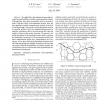Free Online Productivity Tools
i2Speak
i2Symbol
i2OCR
iTex2Img
iWeb2Print
iWeb2Shot
i2Type
iPdf2Split
iPdf2Merge
i2Bopomofo
i2Arabic
i2Style
i2Image
i2PDF
iLatex2Rtf
Sci2ools
106
click to vote
SIMPRA
2010
2010
State-dependent stochastic mobility model in mobile communication networks
Abstract — We apply finite state-dependent queueing networks to model mobility in mobile communication systems. Although they have been successfully used in the past to model vehicular traffic, state-dependent models have not been applied to mobile communication systems, to the best of our knowledge. The novelty of state-dependent stochastic mobility models is that the congestion phenomenon is explicitly considered, that is, the user speeds fall when the number of users in the system increases. We present a detailed description of the simulation model used to estimate the performance measures of the queueing networks and show computational results for a comprehensive set of instances. As we show, finite state-dependent stochastic models bring interesting new insights, for instance, that in some cases mixed bimodal distributions will better describe the cell residence time of a call than the classical probability distributions used in the past. Keywords — Simulation; performance;...
Communication Systems | SIMPRA 2010 | State-dependent Queueing Networks | State-dependent Stochastic Mobility |
Related Content
| Added | 30 Jan 2011 |
| Updated | 30 Jan 2011 |
| Type | Journal |
| Year | 2010 |
| Where | SIMPRA |
| Authors | Frederico R. B. Cruz, P. C. Oliveira, Luiz Duczmal |
Comments (0)

